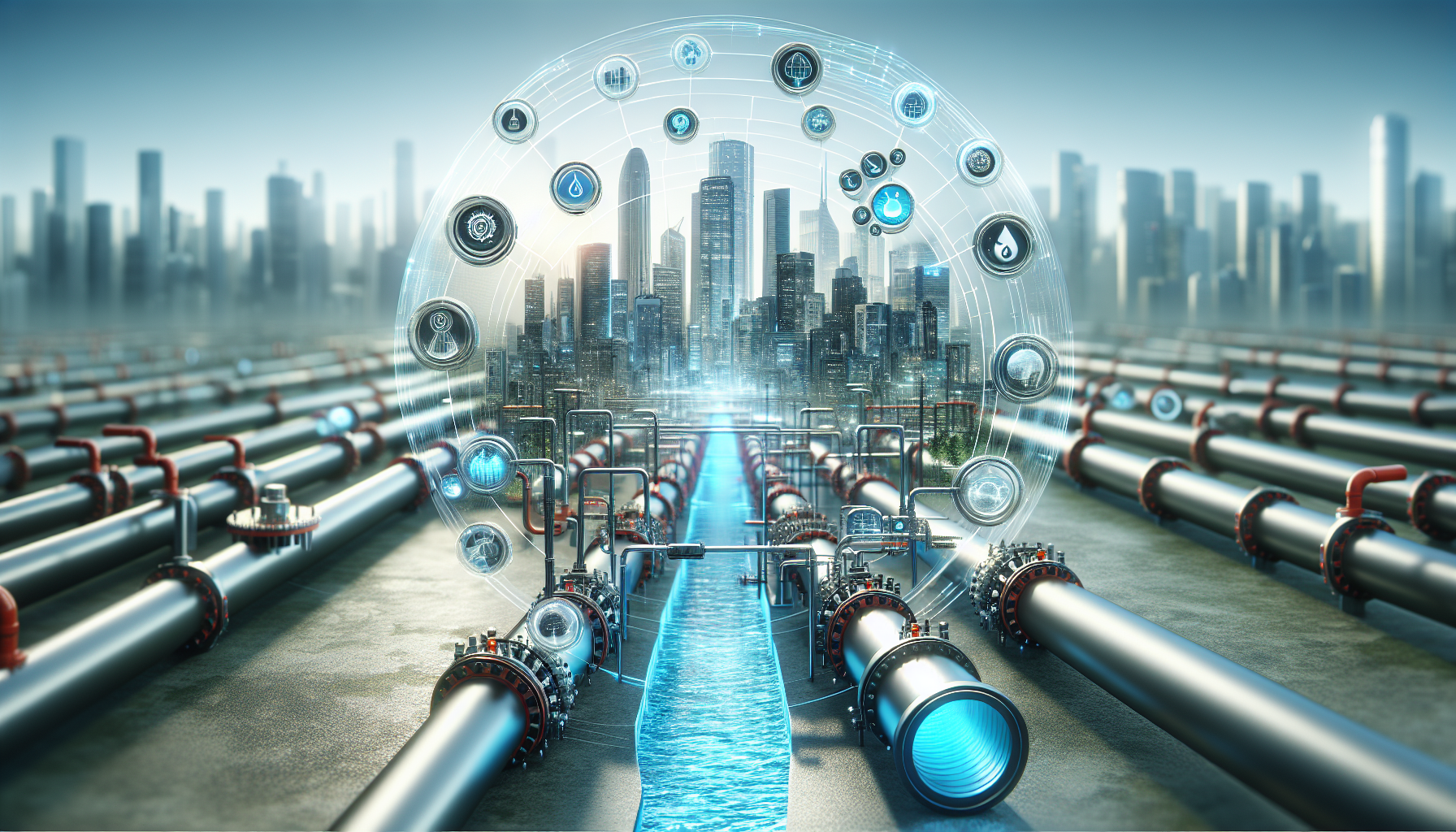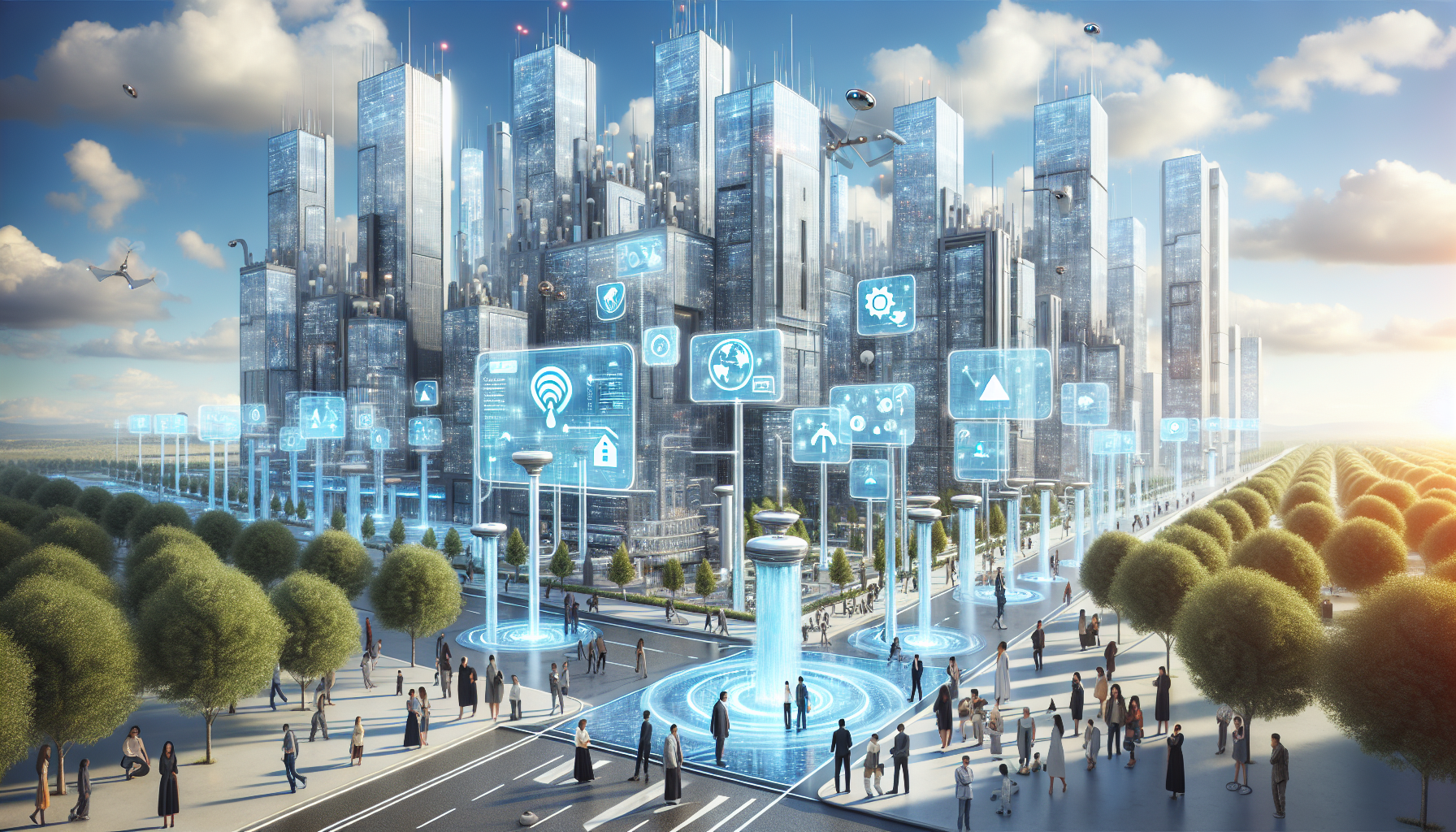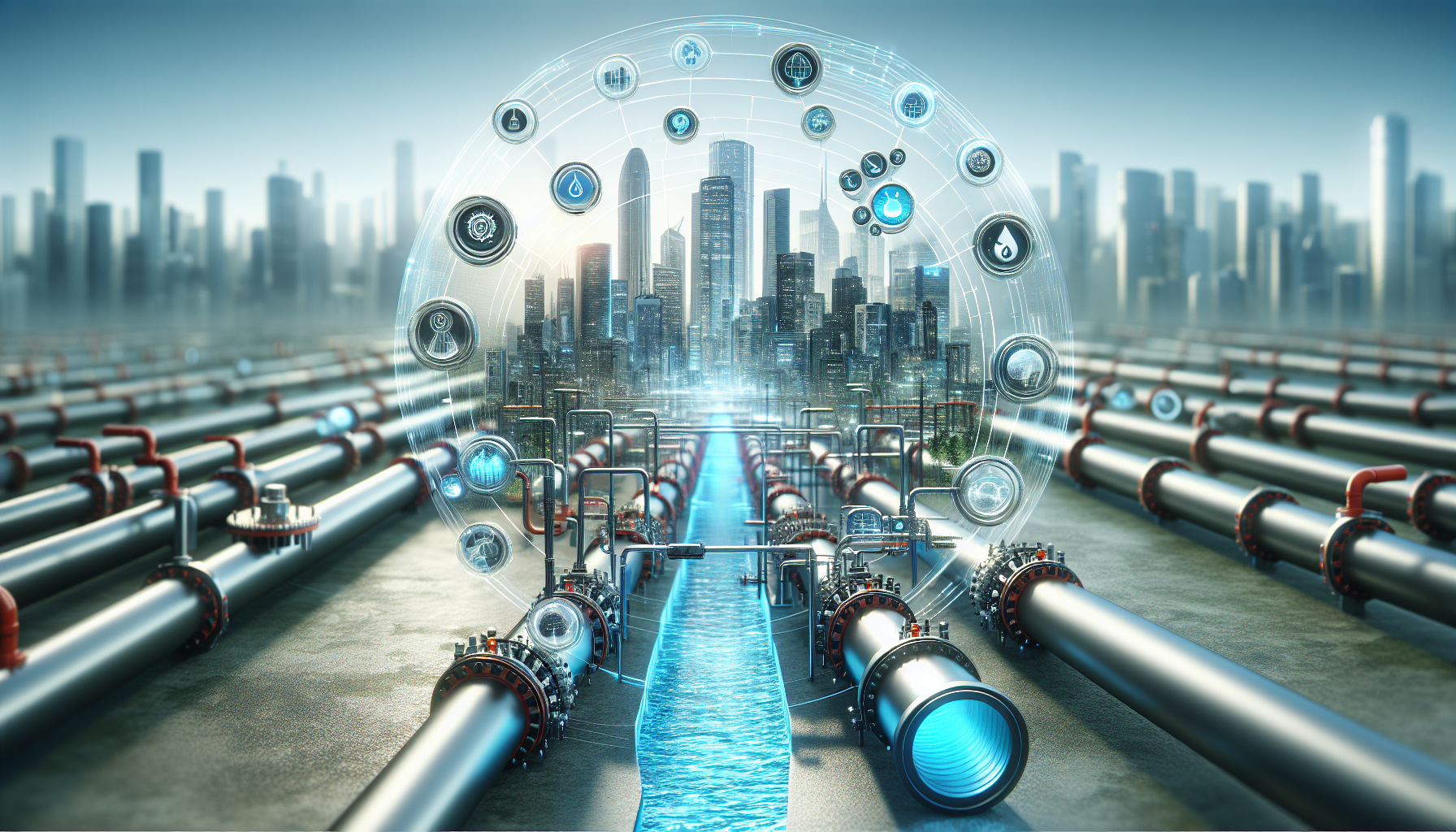In the ever-evolving landscape of technology and urban development, the future of plumbing in smart cities is poised to bring about significant changes. As cities become smarter, more interconnected, and sustainable, plumbing systems will need to adapt to meet the rising demands of these modern urban environments. From advanced water management systems to efficient infrastructure, this article explores how the future of plumbing holds immense potential in shaping the way we live and thrive in smart cities.

Smart Cities and the Importance of Plumbing
The concept of smart cities
Smart cities are an innovative and forward-thinking concept that aims to improve the quality of life for residents through the integration of technology and data. These cities leverage digital technologies to enhance various aspects of urban life, such as transportation, energy, and public safety. However, one crucial aspect that often goes unnoticed in discussions of smart cities is plumbing.
The role of plumbing in smart cities
Plumbing plays a vital role in the functionality and sustainability of smart cities. It encompasses the systems and infrastructure responsible for the distribution, treatment, and management of water and sewage. Without efficient plumbing systems, a smart city cannot fully optimize its resources and ensure the well-being of its inhabitants.
The challenges and opportunities
While implementing smart plumbing systems in cities presents its own set of challenges, it also offers numerous opportunities for improvement. One major challenge is the integration of digital technologies into existing infrastructure. Adapting traditional plumbing systems to incorporate smart technologies requires careful planning and coordination. However, the benefits are immense, as smart plumbing can revolutionize water conservation, maintenance processes, and user experience.
Integration of Digital Technologies
Internet of Things (IoT) in plumbing
The Internet of Things (IoT) has revolutionized various industries, and plumbing is no exception. By embedding sensors and connectivity into plumbing systems, it becomes possible to monitor and control various aspects of water distribution and management. IoT-enabled devices can communicate with each other, providing valuable insights that enable efficient resource utilization and maintenance.
Sensors and monitoring systems for water management
Sensors play a crucial role in smart plumbing systems by providing real-time data on water usage, pressure, temperature, and quality. These sensors can detect leaks, measure flow rates, and identify areas of improvement, enabling early interventions and proactive maintenance. By continuously monitoring water usage patterns, cities can optimize resource allocation and identify potential issues before they become critical.
Real-time data analysis and predictive maintenance
With the abundance of data generated by smart plumbing systems, cities can utilize advanced analytics to gain actionable insights. Real-time data analysis allows for quick response to anomalies, such as unusual water consumption patterns or sudden pressure drops. Additionally, predictive maintenance algorithms can identify potential failures and schedule maintenance activities, preventing costly disruptions and reducing repair times.
Water Conservation and Management
Smart meters and water monitoring
Smart meters are an essential component of water conservation in smart cities. These devices provide accurate and real-time information on water consumption, allowing users to monitor their usage and make informed decisions. By promoting awareness and accountability, smart meters encourage responsible water usage and help reduce wastage.
Leak detection and prevention systems
Leaks can cause significant water waste and damage infrastructure if left unnoticed. Smart cities employ advanced leak detection systems that use acoustic sensors and pressure monitoring to continuously scan pipes for leaks. These systems can detect even the smallest leaks and send alerts to maintenance teams for immediate action, preventing water loss and minimizing repair costs.
Automated water usage control
Smart cities leverage automation to optimize water usage. By integrating smart valves and control systems, cities can regulate water flow and pressure based on demand. For instance, during periods of low water demand, valves can automatically reduce flow rates, ensuring efficient resource allocation and reducing energy consumption.
Efficient Water Distribution Systems
Smart valves and pressure control
Smart valves play a crucial role in the efficient distribution of water in smart cities. These valves can adjust water pressure and flow rates based on real-time demand, ensuring optimal performance and minimizing waste. By dynamically adapting to changing conditions, smart valves maintain constant water pressure while avoiding unnecessary energy consumption.
Optimization algorithms for water flow
Optimization algorithms help smart cities manage water distribution more effectively. By analyzing data on water consumption, flow rates, and pressure, these algorithms can identify areas where demand exceeds supply. By redistributing water resources and reconfiguring the distribution network, cities can ensure equal access to water and minimize shortages.
Prioritizing water allocation based on demand
In times of limited water supply, smart cities can prioritize water allocation based on demand. By using data on real-time usage patterns, cities can identify critical areas and adjust distribution accordingly. This allows for fair and strategic allocation, ensuring essential needs are met while conserving water resources.

Improved Maintenance and Repair Processes
Remote diagnostics and predictive maintenance
Smart plumbing systems enable remote diagnostics and predictive maintenance, drastically improving efficiency and reducing downtime. Through remote monitoring and analysis, technicians can identify issues without physically inspecting the infrastructure. Predictive maintenance algorithms can forecast equipment failure, enabling proactive repairs and reducing the chances of unexpected disruptions.
Automation of repair processes
Automation plays a significant role in streamlining repair processes in smart cities. Smart technologies can detect faults and initiate repair processes automatically, eliminating the need for manual interventions. For example, an automated system can detect a leak and send a repair request to the nearest available technician, saving time and resources.
Efficient inventory management
Effective inventory management is crucial for maintaining efficient repair processes. In smart cities, advanced inventory management systems track the availability of spare parts and equipment. These systems automatically generate orders when stock levels are low, ensuring that technicians have the necessary resources to perform repairs promptly and minimizing downtime.
Enhanced User Experience
Smart faucets and fixtures
Smart faucets and fixtures offer an enhanced user experience by incorporating technology into everyday water usage. These devices can be controlled remotely, allowing users to adjust temperature, flow rate, and even the duration of water usage. With features such as touchless operation, smart faucets promote hygiene while providing convenience and customization.
Personalized water temperature and pressure settings
Smart plumbing systems enable users to personalize their water temperature and pressure settings. By saving individual preferences, these systems provide a consistent and enjoyable experience for users. Whether it’s a soothing warm shower or a powerful jet spray, smart plumbing caters to individual preferences while optimizing water usage.
Mobile applications for water management
Mobile applications have become an integral part of managing various aspects of our lives, and water management is no exception. Smart cities offer mobile applications that allow users to monitor their water usage, receive alerts about leaks or abnormal usage, and adjust settings remotely. These applications empower users by providing them with control and visibility over their water consumption.
The Role of Artificial Intelligence
Machine learning for demand prediction
Artificial Intelligence (AI) and machine learning algorithms play a crucial role in predicting water demand in smart cities. By analyzing historical usage patterns, weather data, and demographic information, these algorithms can forecast future demand accurately. This enables cities to optimize water distribution and allocate resources efficiently, ensuring a reliable supply for all residents.
AI-powered decision-making systems
AI-powered decision-making systems help smart cities make informed choices regarding water management. By processing large volumes of data, these systems can identify trends, patterns, and correlations that human operators may miss. This allows for better decision-making in areas such as supply and demand planning, infrastructure investments, and resource allocation.
Optimizing water usage based on user behavior
Smart cities leverage AI to analyze user behavior and optimize water usage accordingly. By understanding individual preferences and consumption patterns, AI algorithms can suggest personalized recommendations for water conservation. For example, if a user consistently uses excessive water, the system can provide tips for reducing usage without compromising comfort.
Smart Sewage and Waste Management
Real-time monitoring of sewage systems
Smart cities employ real-time monitoring systems for sewage infrastructure to ensure efficient waste management. Sensors and monitoring devices detect changes in flow rates, water quality, and potential blockages, enabling proactive maintenance and preventing system failures. Real-time monitoring allows for immediate response to issues, reducing downtime and minimizing the environmental impact.
Smart waste disposal and recycling
Waste disposal and recycling are essential aspects of smart sewage management. Smart cities implement waste disposal systems that optimize collection routes and detect fill levels in bins, ensuring timely and efficient waste removal. Moreover, advanced recycling technologies can capture valuable resources from wastewater, contributing to a more sustainable and eco-friendly urban environment.
Efficient treatment processes
Smart sewage systems can improve treatment processes by utilizing advanced technologies. By integrating sensors and automation, cities can monitor and optimize treatment parameters in real-time. This allows for precise control over chemical dosing, energy usage, and effluent quality, reducing operational costs and minimizing environmental impact.
Data Security and Privacy Concerns
Protecting sensitive water usage data
As smart plumbing systems collect vast amounts of data on water usage, it is crucial to prioritize data security and protect sensitive information. Smart cities must implement stringent protocols to ensure data confidentiality, integrity, and availability. Encrypting data, restricting access, and regularly updating security measures will safeguard personal information and prevent unauthorized use.
Preventing hacking and unauthorized access
Maintaining secure smart plumbing systems requires constant vigilance against hacking and unauthorized access. Smart cities must regularly update and patch their software, implement multi-factor authentication, and conduct regular security audits. Collaboration between technology providers, cybersecurity experts, and local governments is essential for staying ahead of potential threats.
Balancing data collection with privacy rights
While data collection is necessary for optimizing smart plumbing systems, it must be balanced with privacy rights. Smart cities must be transparent about the data collected, provide clear opt-out options, and obtain explicit consent from users. Implementing privacy policies, anonymizing data, and complying with relevant data protection regulations are essential for building trust within the community.
Collaboration and Integration
Interconnectivity with other smart city domains
Successful implementation of smart plumbing systems requires seamless integration with other smart city domains. Collaborating with transportation, energy, and waste management sectors enables cities to optimize resource allocation and improve planning and decision-making. Integrating data from multiple domains provides a holistic view of urban operations and allows for more effective and sustainable management.
Partnerships between plumbers and technology providers
To implement and maintain smart plumbing systems, close partnerships between plumbers and technology providers are essential. Plumbers bring their expertise in traditional plumbing systems, while technology providers offer innovation and insights into smart technologies. By working together, these stakeholders can ensure seamless integration and efficient operation of smart plumbing systems.
Standardization of smart plumbing systems
Standardization plays a crucial role in the widespread implementation of smart plumbing systems. It fosters interoperability between different technologies and ensures compatibility across various cities and regions. Establishing common protocols, technical standards, and certification processes enables scalability, reduces costs, and encourages innovation in the smart plumbing industry.
In conclusion, plumbing plays a significant role in the development of smart cities. Through the integration of digital technologies, water conservation, efficient distribution, improved maintenance processes, enhanced user experience, and smart sewage management can be achieved. However, addressing data security and privacy concerns, promoting collaboration and integration, and standardizing smart plumbing systems are vital for successful implementation. With a comprehensive and holistic approach, smart plumbing can contribute to the sustainable and efficient development of cities, ensuring a better quality of life for residents now and in the future.

